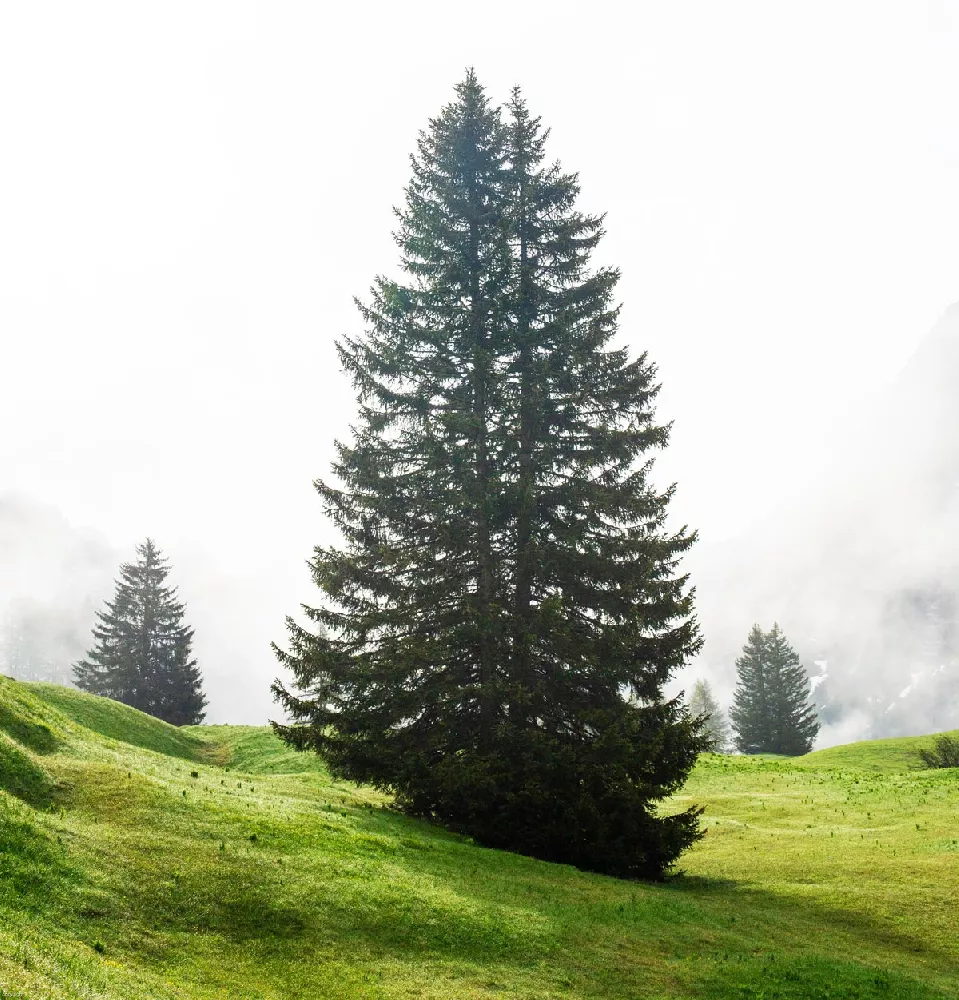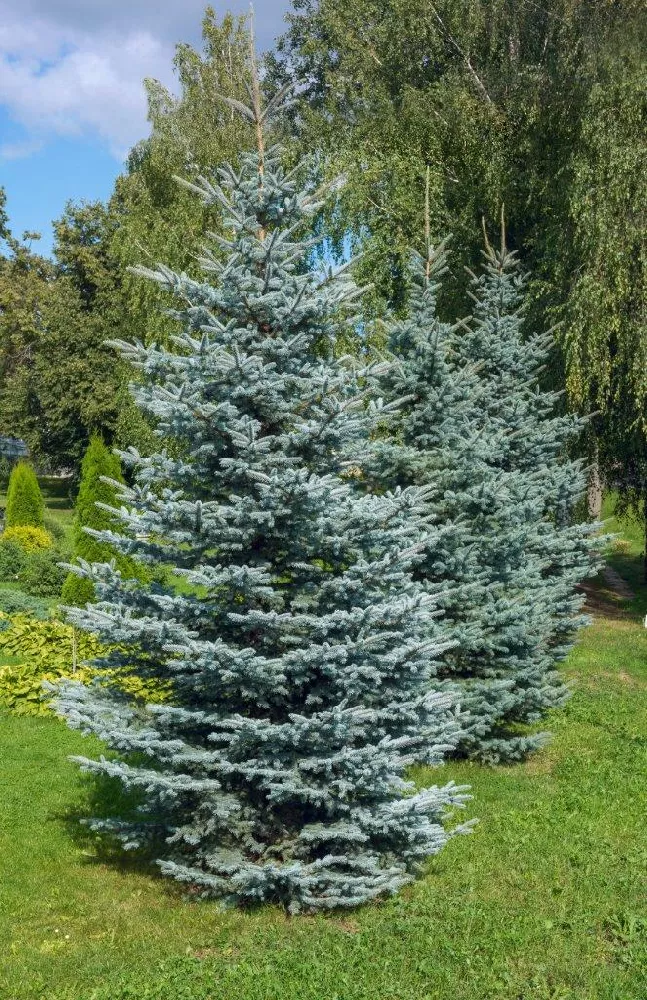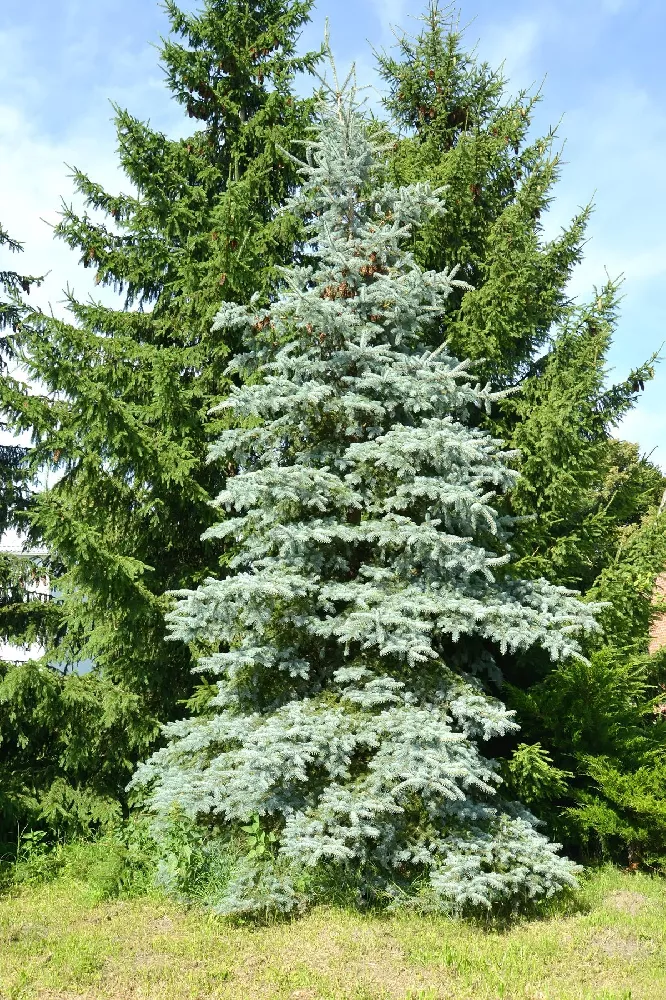- Home >
- Spruce Trees >
- Baby Blue Spruce Tree
Baby Blue Spruce Tree for Sale - Buying & Growing Guide
- Ships in 1-2 days
- 1-Year Warranty Eligible
- Pots or accessories are not included unless specified in the product options.
Shipping Details:
Once your order is shipped, you’ll receive an email with a tracking number and estimated delivery date. Most orders ship immediately, but some items are seasonal and may only ship in spring or fall. These products are noted on the website.
The Baby Blue Spruce Tree, or Picea pungens 'Baby Blue,' is one of the most attractive evergreen trees you can own. The needles of this tree have a bright, vibrant blue hue that makes this plant stand out more than nearly any other evergreen species. The Baby Blue Spruce Tree also has a graceful conical form, similar to that of a traditional Christmas tree, and has excellent cold hardiness that allows it to survive as far north as hardiness zone two.
- The needled foliage of the Baby Blue Spruce Tree is surprisingly vibrant.
- This cultivar remains much smaller than a typical blue spruce tree.
- The Baby Blue Spruce Tree survives well in areas with harsh winters.
Plant Care
Sunlight

The Baby Blue Spruce Tree can survive in partial shade but prefers full sunlight settings.
Watering
Water this plant weekly or multiple times per week during establishment. After establishment, water this plant during droughts and hot weather.
Fertilizing

You can feed your Baby Blue Spruce Tree with a 10-10-10 fertilizer once per year in spring.
Planting and Care
Planting instructions
The ideal setting for the Baby Blue Spruce Tree is one that receives full sunlight and has moist, nutrient-rich soil. However, this plant can also survive in partial shade and adapts well to nearly any soil type as long as it has good drainage. The best way to plant this tree is to dig a hole that is as deep as the root ball is tall and about twice as wide. While this plant is on the smaller side compared to most spruces, it still needs about 10 feet of lateral space into which it can spread its canopy.
Watering and nutrients
During the first few months after planting a Baby Blue Spruce Tree, you should supply water about once per week or more to maintain consistent soil moisture. Following establishment, this plant won’t need very much water, except in the case of a prolonged drought or heatwave. You can feed this plant annually using a balanced fertilizer or a natural soil amendment such as compost. If you feed this tree with fertilizer, you should supply plenty of water during and after the feeding to reduce the odds of fertilizer burn.
Pollination
As is true of all conifers, the Baby Blue Spruce Tree relies on wind, rather than insects, to conduct pollination. Each Baby Blue Spruce Tree will develop sets of male and female cones. When the male cones open, they will release their pollen into the air. Then, wind currents will carry the pollen to the female cones. However, you won’t need to worry about pollination while caring for your Baby Blue Spruce Tree since this plant does not produce an edible harvest.
Pruning
Generally, you should allow your Baby Blue Spruce Tree to develop naturally rather than altering its growth habit via shaping. When left alone, this plant will create a neat conical form that looks fantastic. Use your pruning to remove any damaged, diseased or dead parts of this plant. Typically, it is best to perform pruning during the later winter or early spring. You should also ensure that your pruning tools are sharp and sterile to reduce the risk of spreading disease.
Pests, diseases and animals
The Baby Blue Spruce Tree has incredible durability and resilience, which includes a strong resistance to pests. As such, you likely won’t need to worry too much about infestations when caring for this plant as long as you grow it in a suitable location. Additionally, the Baby Blue Spruce Tree is resistant to deer browsing. However, it remains possible for this plant to encounter infections, which typically arise from fungal accumulations. Some of the most common diseases that may occur are canker and tip blight.
Achieving maximum results
You should not underestimate how tough the Baby Blue Spruce Tree can be when choosing a growing location for this plant. It is not only resistant to most pests and deer browsing, but it also shows an incredible ability to survive in adverse growing conditions. Specifically, this plant is well-suited to withstand harsh winter conditions, as its form allows it to shed snow accumulations. Along with that, the Baby Blue Spruce Tree can also tolerate salt, temperatures well below freezing, and strong winds.
FAQs
How large does the Baby Blue Spruce Tree grow?
In most cases, the Baby Blue Spruce Tree will reach about 15 to 25 feet tall with a maximum spread of about 15 feet. The reason for that manageable size is that this plant is a semi-dwarf cultivar of a much larger species known as Picea pungens or “Blue Spruce.” That parent species is considerably taller than the Baby Blue Spruce Tree, often growing to 75 feet tall or more.
Why is my Baby Blue Spruce Tree losing its needles?
A healthy Baby Blue Spruce Tree should not lose significant amounts of its foliage. If you notice that your tree has dropped a noticeable amount of needles, know that this is likely a sign of disease. The most common cause of needle drop in a Baby Blue Spruce Tree is fungal growth, which typically happens when this plant receives too much water.
Is the Baby Blue Spruce Tree a fast-growing plant?
The Baby Blue Spruce Tree is not a fast-growing tree, but it does not have considerably slow growth either. Instead, it has a moderate growth rate. During most of the growing season, this plant will increase its size by about six inches to one foot. This manageable growth rate ensures that your Baby Blue Spruce Tree will not grow out of control and start outcompeting other plants in your garden.
Compare Similar Products
You can't add more Product Name - Product size to the cart.
OK









